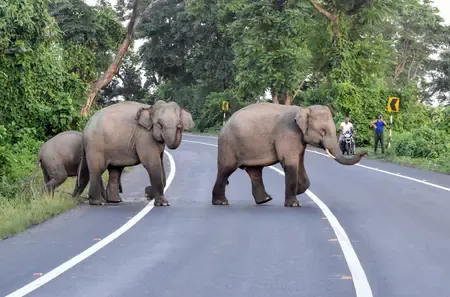Why Are Human-Elephant Conflicts Escalating in Coimbatore, TN?

Synopsis
Key Takeaways
- Human-elephant conflicts in Coimbatore are escalating.
- There is a significant shortage of forest watchers.
- Areas like Boluvampatti and Mettupalayam are most affected.
- Community trust is crucial for conflict resolution.
- Future recruitment of watchers may address this issue.
Chennai, Sep 2 (NationPress) The Coimbatore forest division in Tamil Nadu is witnessing a concerning surge in human-elephant conflicts, with wild herds increasingly venturing into local villages, inflicting damage to crops, destroying property, and occasionally posing a threat to residents.
This alarming situation highlights a significant shortage of frontline personnel required to monitor elephant movements and safely guide them back to their natural habitats.
Over the years, the number of anti-poaching watchers, who are pivotal for ground-level conservation efforts and conflict prevention, has drastically declined. The division, which once had around 160 watchers in 2023, now operates with a mere 60.
The reduction in personnel has been exacerbated by the reclassification of many senior watchers, who had over ten years of service, to other roles, leaving vast areas prone to conflict inadequately monitored. These watchers are often sourced from tribal communities residing near the forests, possessing invaluable knowledge of the terrain and animal behavior.
Such expertise is crucial for anticipating elephant movements, promptly addressing crop raids, and aiding regular forest staff in relocating animals away from human habitats. However, with such limited personnel, even essential patrolling and crop protection tasks have become increasingly challenging.
The situation is particularly dire in regions like Boluvampatti, Periyanaickenpalayam, Karamadai, and Mettupalayam, where elephant intrusions are rampant.
With only a few watchers remaining in each area, many are occupied with routine clerical or maintenance duties, making it nearly impossible to prevent raids on standing crops.
The risk faced by frontline staff, particularly those working at night with minimal backup, has surged. Environmental advocates argue that deploying a larger, dedicated team of watchers could significantly mitigate conflicts and prevent casualties among both humans and elephants.
They stress that a specialized unit focused solely on conflict resolution could bolster community trust and minimize damage to livelihoods.
Forest officials acknowledge that vacancies in other roles, such as forest guards and rangers, have recently been filled, and more watchers may be recruited for high-conflict regions in the future. However, for the time being, residents living adjacent to forest areas continue to grapple with an increasingly unstable environment, as the dissonance between human settlements and elephant habitats grows more precarious.









